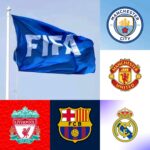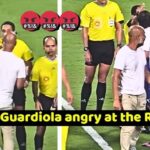Erling Haaland appeared to jokingly tell £18m Al-Hilal player that he would like him to sign for Man City

The FIFA Club World Cup has always been a stage where footballing giants collide, but rarely has the tournament witnessed an upset as seismic as Al-Hilal’s stunning 4-3 victory over Manchester City. In a match that will be remembered for years to come, the Saudi Arabian champions dismantled Pep Guardiola’s star-studded squad in what many are calling the biggest shock in the competition’s recent history. At the heart of this David versus Goliath encounter was a moment of levity that perfectly captured the spirit of the beautiful game – Erling Haaland’s post-match conversation with Al-Hilal’s goalkeeper Yassine Bounou.
The Upset That Shook World Football
Manchester City entered the FIFA Club World Cup as overwhelming favorites, armed with a squad valued at over £1 billion and fresh from their domestic and European successes. Pep Guardiola’s tactical masterclass had become synonymous with footballing excellence, and few expected Al-Hilal to pose a serious threat to their ambitions. However, football has a way of humbling even the mightiest, and this encounter served as a stark reminder that the beautiful game cannot be played on paper.
The match itself was a roller-coaster of emotions, with both teams trading blows in a contest that epitomized the unpredictable nature of knockout football. Al-Hilal took an early lead, capitalizing on Manchester City’s sluggish start and defensive lapses that would plague them throughout the encounter. The Saudi side’s aggressive pressing and clinical finishing caught Guardiola’s men off guard, exposing vulnerabilities that had been masked by their domestic dominance.
Erling Haaland, Manchester City’s £51 million Norwegian striker, emerged as the focal point of his team’s fightback. The 24-year-old forward, who has made a career out of finding the back of the net with ruthless efficiency, showcased his predatory instincts by netting a crucial equalizer in the 55th minute. His goal, a trademark finish that demonstrated his ability to find space in the most congested areas, leveled the scoreline at 2-2 and gave City hope of turning the tide in their favor.
The Decisive Moments
Despite Haaland’s intervention, Manchester City’s defensive frailties continued to be exposed by Al-Hilal’s relentless attacking play. The Premier League champions’ backline, which had been a cornerstone of their success in recent seasons, appeared disjointed and vulnerable to the Saudi side’s pace and movement. Every Al-Hilal attack seemed to carry genuine threat, with their forwards finding space behind Manchester City’s high defensive line with alarming regularity.
The match reached its crescendo in the dying moments when Haaland found himself with a golden opportunity to put Manchester City ahead. Manuel Akanji’s header had rebounded fortuitously into the path of the Norwegian striker, presenting him with what appeared to be a simple tap-in into an empty net. However, in a moment that would haunt him long after the final whistle, Haaland’s attempt was miraculously cleared off the line by an Al-Hilal defender, denying him what would have been the decisive goal.
This missed opportunity proved costly as Al-Hilal capitalized on Manchester City’s wastefulness in front of goal. The Saudi champions’ clinical finishing stood in stark contrast to City’s profligacy, with every chance converted with precision and composure. The final scoreline of 4-3 in favor of Al-Hilal represented not just a numerical advantage, but a comprehensive victory that exposed the Premier League champions’ weaknesses on the grandest stage.
The Goalkeeper Who Stood Tall
At the heart of Al-Hilal’s historic victory was the exceptional performance of Yassine Bounou, the Moroccan goalkeeper whose heroics between the posts proved instrumental in his team’s success. The £18 million shot-stopper, who had joined Al-Hilal as part of the Saudi Pro League’s ambitious recruitment drive, delivered a performance that will be etched in the annals of Club World Cup history.
Bounou’s display was a masterclass in goalkeeping, combining athletic prowess with tactical intelligence to frustrate Manchester City’s star-studded attack. His positioning throughout the match was exemplary, cutting out crosses and dealing with through balls with the confidence of a goalkeeper operating at the peak of his powers. Every save seemed to grow in importance as the match progressed, with each denial adding to the mounting pressure on Manchester City’s shoulders.
The Moroccan international’s distribution also played a crucial role in Al-Hilal’s tactical approach. His quick releases and accurate long balls helped his team transition rapidly from defense to attack, catching Manchester City’s high line off guard on numerous occasions. This aspect of his game demonstrated that modern goalkeeping extends far beyond shot-stopping, encompassing the ability to initiate attacking moves and control the tempo of the game.
What made Bounou’s performance even more remarkable was his composure under pressure. Facing a Manchester City attack featuring some of the world’s most feared forwards, he remained calm and collected throughout the encounter. His shot-stopping ability was on full display as he made several crucial saves that kept Al-Hilal’s hopes alive during Manchester City’s periods of dominance.
The Post-Match Exchange
In the immediate aftermath of Al-Hilal’s stunning victory, as players from both teams processed the magnitude of what had just transpired, a moment of genuine sporting camaraderie emerged. Erling Haaland, despite his disappointment at the result and his missed opportunity, approached Yassine Bounou with a gesture that encapsulated the spirit of football that transcends team loyalties and national boundaries.
According to reports from Actu Foot Maroc, Haaland jokingly suggested to Bounou that he should consider joining Manchester City, presumably recognizing the goalkeeper’s exceptional performance and the impact he could have at the Etihad Stadium. This light-hearted exchange, occurring moments after one of the most significant upsets in recent Club World Cup history, demonstrated the mutual respect that exists between elite athletes, regardless of the outcome of their on-field battles.
Bounou’s response to Haaland’s playful recruitment pitch was equally gracious, laughing off the suggestion as the two players embraced. This moment of levity served as a powerful reminder that football, at its core, remains a game that brings people together, creating bonds that extend beyond the ninety minutes of competition. The image of these two players, representing different continents and footballing cultures, sharing a moment of mutual respect, perfectly captured the global appeal of the beautiful game.
The Broader Implications
Haaland’s post-match interaction with Bounou, while seemingly innocuous, highlighted several broader themes that resonate throughout modern football. The Norwegian striker’s acknowledgment of the goalkeeper’s exceptional performance demonstrated the professional recognition that exists between players who understand the demands and pressures of elite-level competition.
The fact that Haaland, one of the world’s most prolific goal scorers, took the time to engage with the player who had denied him and his team victory, speaks volumes about his character and sporting attitude. In an era where football is often criticized for its lack of genuine emotion and connection, such moments serve as reminders of the human elements that make the sport so compelling.
Furthermore, the exchange shed light on the increasing globalization of football talent and the recognition that exceptional players can emerge from any league or competition. Bounou’s move to Al-Hilal as part of the Saudi Pro League’s expansion had initially been viewed with skepticism by some observers, but his performance against Manchester City demonstrated that talent and determination can flourish in any environment.
Manchester City’s Tactical Shortcomings
While Bounou’s individual brilliance was undoubtedly crucial to Al-Hilal’s victory, Manchester City’s defeat also exposed several tactical and strategic issues that had been building throughout their recent campaigns. Pep Guardiola’s team, despite their technical superiority and tactical sophistication, appeared unprepared for Al-Hilal’s aggressive pressing and direct style of play.
The Premier League champions’ defensive vulnerabilities were particularly evident throughout the match, with their high line consistently exploited by Al-Hilal’s pace and movement. The absence of a commanding presence in central defense left Manchester City exposed to counter-attacks, while their full-backs struggled to provide the necessary width and defensive stability required in such a high-stakes encounter.
Ederson’s performance in goal also came under scrutiny, with the Brazilian goalkeeper’s distribution and decision-making appearing below his usual high standards. His role in conceding some of Al-Hilal’s goals raised questions about Manchester City’s goalkeeping department and whether changes might be necessary to address their defensive frailties.
The Saudi Pro League’s Growing Influence
Al-Hilal’s victory over Manchester City represented more than just a single match result; it symbolized the growing influence and ambition of the Saudi Pro League on the global football stage. The Saudi Arabian league’s significant investment in world-class players and infrastructure has begun to yield dividends, with Al-Hilal’s performance demonstrating that the gap between traditional European powerhouses and emerging football markets is narrowing.
Bounou’s recruitment to Al-Hilal, along with other high-profile signings across the Saudi Pro League, has elevated the standard of competition and attracted global attention to Middle Eastern football. The goalkeeper’s performance against Manchester City served as a powerful advertisement for the league’s quality and ambition, potentially encouraging other world-class players to consider opportunities in Saudi Arabia.
This shift in football’s global landscape has implications that extend far beyond individual matches or competitions. The emergence of competitive leagues outside Europe’s traditional strongholds challenges established hierarchies and creates new pathways for player development and career progression.
Haaland’s Missed Opportunity and Its Consequences
The Norwegian striker’s late miss proved to be one of the defining moments of the match, highlighting the fine margins that often determine the outcome of elite-level football. Haaland’s reputation as one of the world’s most clinical finishers made his failure to convert such a clear opportunity all the more surprising and significant.
The psychological impact of such misses cannot be understated, particularly in high-pressure situations like the FIFA Club World Cup. For a player of Haaland’s caliber, accustomed to finding the back of the net with remarkable consistency, the missed chance likely weighed heavily on his mind as the match progressed toward its conclusion.
However, Haaland’s post-match demeanor and his interaction with Bounou demonstrated his ability to compartmentalize disappointment and maintain perspective. Rather than dwelling on his missed opportunity, he chose to acknowledge the quality of his opponents and engage in positive interactions that reflected his maturity and professionalism.
The Future Implications
The aftermath of Al-Hilal’s victory over Manchester City will likely have lasting implications for both clubs and the broader football landscape. For Manchester City, the defeat serves as a wake-up call, highlighting areas that require immediate attention if they are to maintain their status among the world’s elite clubs.
Pep Guardiola’s tactical approach may need refinement to address the defensive vulnerabilities exposed by Al-Hilal’s aggressive style of play. The Spanish manager’s ability to adapt and evolve his methods will be crucial in ensuring that such upsets do not become a recurring theme for Manchester City.
For Al-Hilal, the victory represents validation of their ambitions and investment in world-class talent. Bounou’s performance, in particular, demonstrates the value of strategic recruitment and the potential for the Saudi Pro League to compete with established European competitions.
Conclusion
The exchange between Erling Haaland and Yassine Bounou following Al-Hilal’s stunning victory over Manchester City encapsulates everything that makes football the world’s most beloved sport. In a moment of genuine sporting camaraderie, two players from different backgrounds and representing different footballing cultures demonstrated the mutual respect and admiration that transcends team loyalties and national boundaries.
Haaland’s playful suggestion that Bounou should join Manchester City, while delivered in jest, reflected his recognition of the goalkeeper’s exceptional talent and the impact such a player could have at the highest level. Bounou’s gracious response and the subsequent embrace between the two players served as a powerful reminder that football, despite its competitive intensity and commercial pressures, remains fundamentally about human connections and shared experiences.
The match itself will be remembered as one of the most significant upsets in FIFA Club World Cup history, with Al-Hilal’s 4-3 victory over Manchester City demonstrating that football’s unpredictable nature continues to provide moments of genuine surprise and excitement. Bounou’s heroic performance between the posts played a crucial role in this historic achievement, while Haaland’s missed opportunity and subsequent graciousness in defeat highlighted the fine margins that often determine success at the highest level.
As football continues to evolve and expand into new markets and territories, encounters like this serve as important reminders of the sport’s universal appeal and its ability to create moments of genuine human connection that resonate far beyond the confines of the pitch. The image of Haaland and Bounou sharing a laugh and an embrace will endure long after the tactical analyses and statistical breakdowns have been forgotten, representing the enduring spirit of a game that continues to captivate audiences around the world.















